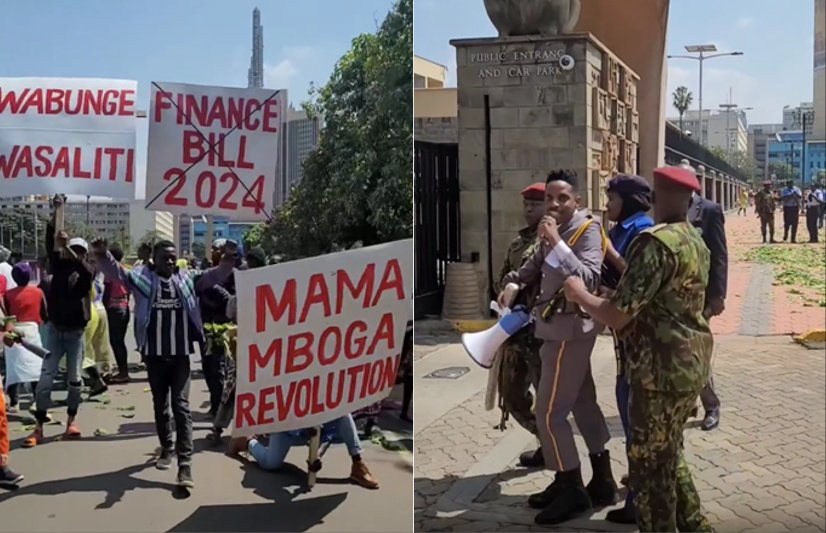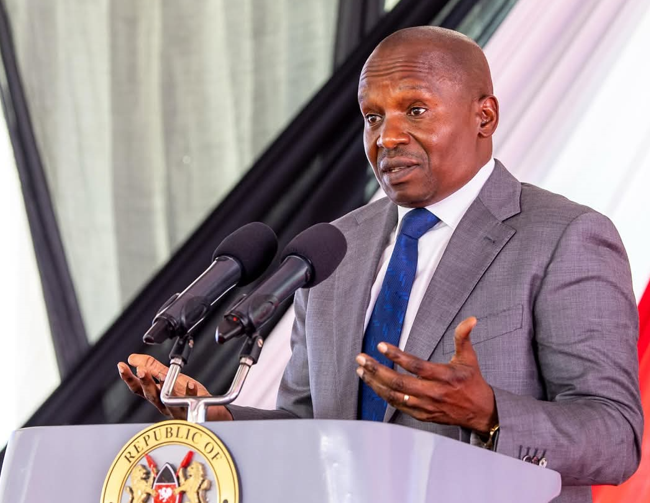Eric Omondi arrested while leading protests against Finance Bill 2024 outside Parliament

In a bizarre and unexpected turn of events, comedian Eric Omondi caused chaos outside the Parliament building as he staged protests against the Finance Bill 2024.
The popular comedian, known for his satirical and humorous skits, stormed Parliament on Tuesday, June 4, 2024, clad in a suit and holding a megaphone.
He was accompanied by a group of his supporters, who were chanting slogans and waving placards.
Omondi began by loudly protesting the proposed tax increases in the Finance Bill 2024, which he claimed would unfairly burden the poor and middle-class citizens.
He accused the government of being out of touch with the people and warned that the bill would lead to widespread suffering and economic hardship.
The comedian’s antics quickly descended into chaos as the protestors he was with littered the main entrance of the Parliament building.
Police responded by dispersing the protesting crowd and pounced on Eric Omondi whom they apprehended.
However, the comedian refused to be silenced and continued speaking through the megaphone even as police hauled him away inside Parliament building.
Finance Bill 2024
Finance Bill 2024 has emerged as a hot-button issue with far-reaching implications for the country’s economy and citizens’ daily lives.
One of the most contentious proposals within the Bill is the imposition of taxes on personal vehicles, a measure that has drawn criticism from various quarters for its potential impact on the average Kenyan.
Additionally, the removal of tax exemptions on capital gains related to the transfer of title of immovable property to family trusts has raised eyebrows and sparked concerns about the Bill’s fairness and equity.
Critics have not minced words in their assessment of the Bill, with the opposition branding it as punitive. This characterization reflects widespread apprehension about the Bill’s potential to exacerbate the financial burden on ordinary citizens.
A key provision of the Bill seeks to reclassify the VAT status of ordinary bread, transitioning it from a zero-rated item to a taxable one at a rate of 16 per cent. This proposed change has raised concerns about its potential impact on consumer prices and the cost of living.
Furthermore, the bill proposes an increase in Excise Duty on financial services and money transfer services from 15 per cent to 20 per cent, a move that has drawn criticism for its potential to further strain the finances of Kenyan households.
Amidst the flurry of contentious proposals, Clause 39 of the bill has attracted significant attention for its proposal to repeal Section 14 of the Excise Duty Act, 2015.
This section currently provides relief on excise duty for raw materials used in the manufacture of excisable goods and for the purchase of bulk data by licensed internet data providers for resale.
The potential repeal of this section has raised concerns about its impact on various sectors of the economy.
In particular, manufacturers of edible oils in Kenya have sounded the alarm over the proposed 25 per cent excise duty on both raw and refined vegetable oils.
They warn that this measure could lead to a substantial increase in the price of edible oil by Ksh160 per litre, posing a significant challenge for consumers already grappling with economic pressures.












